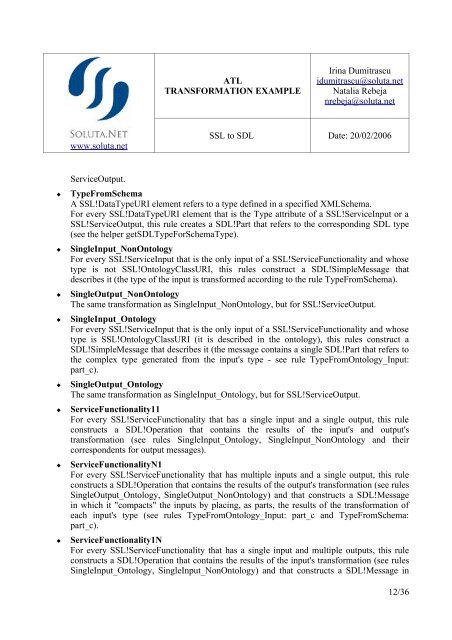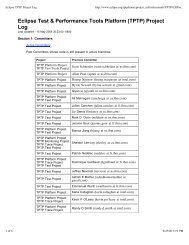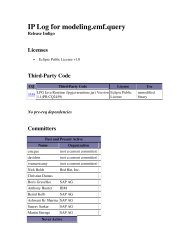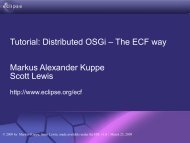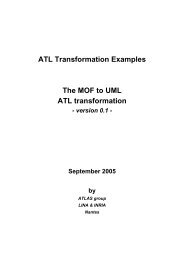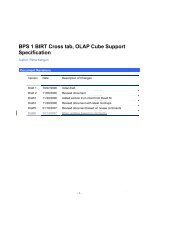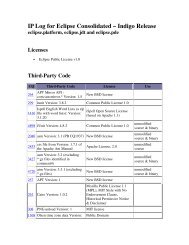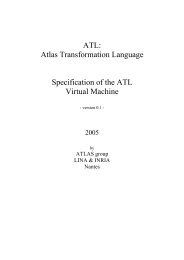ATL Transformation Examples The SSL to SDL ATL ... - Eclipse
ATL Transformation Examples The SSL to SDL ATL ... - Eclipse
ATL Transformation Examples The SSL to SDL ATL ... - Eclipse
You also want an ePaper? Increase the reach of your titles
YUMPU automatically turns print PDFs into web optimized ePapers that Google loves.
www.soluta.net<br />
ServiceOutput.<br />
<strong>ATL</strong><br />
TRANSFORMATION EXAMPLE<br />
Irina Dumitrascu<br />
idumitrascu@soluta.net<br />
Natalia Rebeja<br />
nrebeja@soluta.net<br />
<strong>SSL</strong> <strong>to</strong> <strong>SDL</strong> Date: 20/02/2006<br />
� TypeFromSchema<br />
A <strong>SSL</strong>!DataTypeURI element refers <strong>to</strong> a type defined in a specified XMLSchema.<br />
For every <strong>SSL</strong>!DataTypeURI element that is the Type attribute of a <strong>SSL</strong>!ServiceInput or a<br />
<strong>SSL</strong>!ServiceOutput, this rule creates a <strong>SDL</strong>!Part that refers <strong>to</strong> the corresponding <strong>SDL</strong> type<br />
(see the helper get<strong>SDL</strong>TypeForSchemaType).<br />
� SingleInput_NonOn<strong>to</strong>logy<br />
For every <strong>SSL</strong>!ServiceInput that is the only input of a <strong>SSL</strong>!ServiceFunctionality and whose<br />
type is not <strong>SSL</strong>!On<strong>to</strong>logyClassURI, this rules construct a <strong>SDL</strong>!SimpleMessage that<br />
describes it (the type of the input is transformed according <strong>to</strong> the rule TypeFromSchema).<br />
� SingleOutput_NonOn<strong>to</strong>logy<br />
<strong>The</strong> same transformation as SingleInput_NonOn<strong>to</strong>logy, but for <strong>SSL</strong>!ServiceOutput.<br />
� SingleInput_On<strong>to</strong>logy<br />
For every <strong>SSL</strong>!ServiceInput that is the only input of a <strong>SSL</strong>!ServiceFunctionality and whose<br />
type is <strong>SSL</strong>!On<strong>to</strong>logyClassURI (it is described in the on<strong>to</strong>logy), this rules construct a<br />
<strong>SDL</strong>!SimpleMessage that describes it (the message contains a single <strong>SDL</strong>!Part that refers <strong>to</strong><br />
the complex type generated from the input's type - see rule TypeFromOn<strong>to</strong>logy_Input:<br />
part_c).<br />
� SingleOutput_On<strong>to</strong>logy<br />
<strong>The</strong> same transformation as SingleInput_On<strong>to</strong>logy, but for <strong>SSL</strong>!ServiceOutput.<br />
� ServiceFunctionality11<br />
For every <strong>SSL</strong>!ServiceFunctionality that has a single input and a single output, this rule<br />
constructs a <strong>SDL</strong>!Operation that contains the results of the input's and output's<br />
transformation (see rules SingleInput_On<strong>to</strong>logy, SingleInput_NonOn<strong>to</strong>logy and their<br />
correspondents for output messages).<br />
� ServiceFunctionalityN1<br />
For every <strong>SSL</strong>!ServiceFunctionality that has multiple inputs and a single output, this rule<br />
constructs a <strong>SDL</strong>!Operation that contains the results of the output's transformation (see rules<br />
SingleOutput_On<strong>to</strong>logy, SingleOutput_NonOn<strong>to</strong>logy) and that constructs a <strong>SDL</strong>!Message<br />
in which it "compacts" the inputs by placing, as parts, the results of the transformation of<br />
each input's type (see rules TypeFromOn<strong>to</strong>logy_Input: part_c and TypeFromSchema:<br />
part_c).<br />
� ServiceFunctionality1N<br />
For every <strong>SSL</strong>!ServiceFunctionality that has a single input and multiple outputs, this rule<br />
constructs a <strong>SDL</strong>!Operation that contains the results of the input's transformation (see rules<br />
SingleInput_On<strong>to</strong>logy, SingleInput_NonOn<strong>to</strong>logy) and that constructs a <strong>SDL</strong>!Message in<br />
12/36


